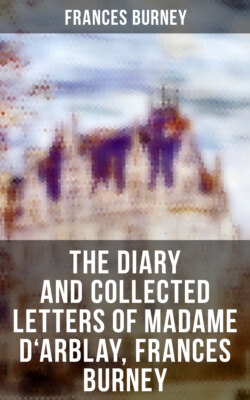Читать книгу The Diary and Collected Letters of Madame D'Arblay, Frances Burney - Frances Burney - Страница 82
На сайте Литреса книга снята с продажи.
Dr. Johnson Dogmatises
ОглавлениеOct. 29.—We had a large party at home in the evening. I was presently engaged by Mr. Pepys, and he was joined by Mr. Coxe, and he by Miss Benson. Mr. Pepys led the conversation, and it was all upon criticism and poetry. The little set was broken up by my retreat, and Mr. Pepys joined Dr. Johnson, with whom he entered into an argument upon some lines of Gray, and upon Pope’s definition of wit, in which he was so roughly confuted, and so severely ridiculed, that he was hurt and piqued beyond all power of disguise, and, in the midst of the discourse, suddenly turned from him, and, wishing Mrs. Thrale good night, very abruptly withdrew.
Dr. Johnson was certainly right with respect to the argument and to reason; but his opposition was so warm, and his wit so satirical and exulting, that I was really quite grieved to see how unamiable he appeared, and how greatly he made himself dreaded by all, and by many abhorred. What pity that he will not curb the vehemence of his love of victory and superiority.
The sum of the dispute was this. Wit being talked of, Mr. Pepys repeated,—
“True wit is Nature to advantage dress’d, What oft was thought, but ne’er so well express’d.”
“That, sir,” cried Dr. Johnson, “is a definition both false and foolish. Let wit be dressed how it will, it will equally be wit, and neither the more nor the less for any advantage dress can give it.”
Mr. P.—But, sir, may not wit be so ill expressed, and so obscure, by a bad speaker, as to be lost?
Dr. J.—The fault, then, sir, must be with the hearer. If a man cannot distinguish wit from words, he little deserves to hear it.
Mr. P.—But, sir, what Pope means—
Dr. J.—Sir, what Pope means, if he means what he says, is both false and foolish. In the first place, ‘what oft was thought,’ is all the worse for being often thought, because to be wit, it ought to be newly thought.
Mr. P.—But, sir, ’tis the expression makes it new.
Dr. J.—How can the expression make it new? It may make it clear, or may make it elegant——but how new? You are confounding words with things.
Mr. P.—But, sir, if one man says a thing very ill, may not another man say it so much better that—
Dr. J.—That other man, sir, deserves but small praise for the amendment; he is but the tailor to the first man’s thoughts.
Mr. P.—True, sir, he may be but the tailor; but then the difference is as great as between a man in a gold lace suit and a man in a blanket.
Dr. J.—Just so, sir, I thank you for that; the difference is precisely such, since it consists neither in the gold lace suit nor the blanket, but in the man by whom they are worn.
This was the summary; the various contemptuous sarcasms intermixed would fill, and very unpleasantly, a quire.
